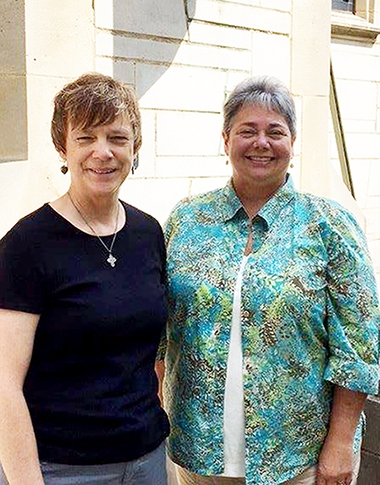
FAYETTEVILLE, Ark. – Betsy Garrison and Zola Moon in the Dale Bumpers College of Agricultural, Food and Life Science's School of Human Environmental Sciences at the U of A are part of a team earning a second grant from the United States Department of Agriculture for health-related projects.
Garrison, director of the School of Human Environmental Sciences, and Moon, clinical associate professor of human development and family sciences, teamed with Charleen McNeill, a former U of A nursing professor now at Fayetteville State University in North Carolina, and Lisa Washburn, associate professor of health, family and consumer science with the U of A System Division of Agriculture, to study opioid use in rural parts of the state. Opioids are drugs used to relieve pain.
Their project, "Evidence-Based Complementary and Alternative Interventions to Prevent Opioid Abuse and Misuse in Rural Arkansas," utilizes county extension agents and trained master health volunteers to offer a Chronic Pain Self-Management Program (CPSMP) and a multi-component exercise program (Move with Ease) in four targeted rural counties. Collaborating with local healthcare providers and pharmacists in the study area, the team will evaluate changes over time in participants' physical and mental well-being, including levels of pain and use of opioid or non-opioid drug intake, as well as quality of life.
"Rural people generally have less access to health care because of a lack of providers and infrastructure such as hospitals and clinics," said Moon. "As a result, increasing their literacy and capacity for alternative care are especially important as these cost-effective changes make real differences in people's overall quality of life. These projects leverage the research expertise of the U of A with the outreach expertise of the Cooperative Extension Service to serve the people of Arkansas. What we learn here in Arkansas provides a model for the rest of the country, especially states with large rural populations like we have."
The same team is working with the University of Arkansas for Medical Sciences Center for Health Literacy on a previously awarded project, "How to Talk to Your Doctor." The group is evaluating the use of materials developed for lower-literacy populations in rural areas along with the effectiveness of the county extension agent/volunteer infrastructure as a possible resource for information. Early results indicate the program is effective in improving health literacy, especially among Medicaid participants.
The two grants combined are worth more than $500,000 from the USDA's Rural Health and Safety Education program.
About the Dale Bumpers College of Agricultural, Food and Life Sciences: Bumpers College provides life-changing opportunities to position and prepare graduates who will be leaders in the businesses associated with foods, family, the environment, agriculture, sustainability and human quality of life; and who will be first-choice candidates of employers looking for leaders, innovators, policy makers and entrepreneurs. The college is named for Dale Bumpers, former Arkansas governor and longtime U.S. senator who made the state prominent in national and international agriculture.
About the University of Arkansas: The University of Arkansas provides an internationally competitive education for undergraduate and graduate students in more than 200 academic programs. The university contributes new knowledge, economic development, basic and applied research, and creative activity while also providing service to academic and professional disciplines. The Carnegie Foundation classifies the University of Arkansas among only 2 percent of universities in America that have the highest level of research activity. U.S. News & World Report ranks the University of Arkansas among its top American public research universities. Founded in 1871, the University of Arkansas comprises 10 colleges and schools and maintains a low student-to-faculty ratio that promotes personal attention and close mentoring.
Topics
Contacts
Robby Edwards, director of communications
Dale Bumpers College of Agricultural, Food and Life Sciences
479-575-4625,